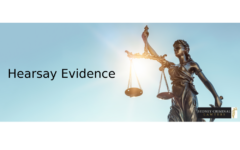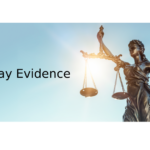Objection! That’s Hearsay.

We’ve all heard rumours which don’t seem to originate from the person who actually observed the subject event.
And while we all have a general understanding of what hearsay means – information received from others which cannot be substantiated- the term has a precise and technical meaning in the legal context.
Although hearsay evidence is generally inadmissible, there are a number of important exceptions which allow some forms to be used in court.
A good, working knowledge of the rules relating to hearsay evidence is therefore vital to running a criminal case in court, whether you are a defence lawyer, prosecutor or are representing yourself.
The Hearsay Rule
Section 59 of the Evidence Act 1995 (‘The Act’) contains the general rule excluding hearsay evidence, also known as the ‘hearsay rule’:
(1) Evidence of a previous representation made by a person is not admissible to prove the existence of a fact that it can reasonably be supposed that the person intended to assert by the representation.
What does this mean?
To understand the hearsay rule, we need to ascertain the meaning of two terms contained therein: ‘representation’ and ‘previous representation’.
‘Representation’
The Act defines a ‘representation’ as including:
(a) an express or implied representation (whether oral or in writing); or
(b) a representation to be inferred from conduct; or
(c) a representation not intended by its maker to be communicated to or seen by another person; or
(d) a representation that for any reason is not communicated.
‘Previous Representation’
It defines a ‘previous representation’ as:
a representation made otherwise than in the course of giving evidence in the proceeding in which evidence of the representation is sought to be adduced.
Putting it all together
In a nutshell, the hearsay rule provides that:
- Hearsay evidence is inadmissible;
- Representations include things said orally, written down, or communicated through conduct; and
- A previous representation is any such statement (whether made orally, in writing or through conduct) made outside of court proceedings.
So the hearsay rule excludes evidence of statements made out of court — whether oral, written, or in the form of conduct— that are sought to be relied on as evidence of the truth of fact asserted by the maker of the representation.
Examples
The operation of the hearsay rule can be illustrated using examples.
Scenario 1
Jane provides a statement to police alleging that “John punched me in the face”.
John is subsequently charged with assaulting Jane.
Jane has a change of heart before John’s criminal trial, deciding not to attend court to testify against John.
As Jane is not present, the prosecution cannot use Jane’s statement as evidence of the truth of the allegations as it is an out of court representation, and therefore cannot be relied upon as proof that John punched her in the face.
Scenario 2
James is charged with committing an armed robbery at a convenience store.
The key prosecution witness is Neil, the store clerk.
Neil went to school with James many years ago and gives a statement to police alleging that:
“James came into the bank with a shotgun demanding all of the money from the tills. I know it was James because I went to school with him and recognised his face as soon as he came into the bank”.
The hearsay rule would not prevent Neil from giving oral evidence at trial to the effect that James committed the robbery.
But what if Neil did not attend the trial, and the only other witness is Neil’s friend Greg who gave a statement to police that “Neil told me that his old school friend James robbed the bank”?
That statement is a previous out of court representation and would be inadmissible under the hearsay rule.
Exceptions to the hearsay rule
The above is a basic outline of the hearsay rule.
However, a number of exceptions to the rule are contained in sections 62 through to 75 of the Act, which relate to topics like ‘first hand hearsay’, ‘business records’ and certain aspects of ‘electronic communications’.
Some of those exceptions are so complex that they have been the subject of appeals to the High Court of Australia.
We will endeavour to simplify those exceptions in upcoming blogs.






